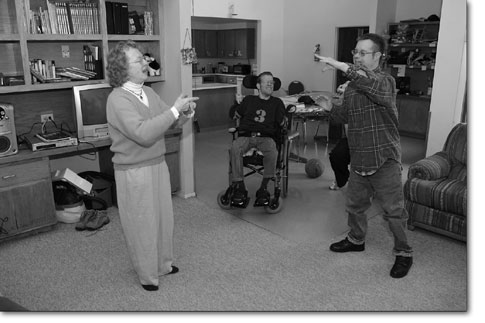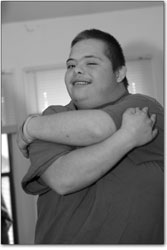|
| ||||
| Breaking down barriers
by Lindsay Nelson For most people, buying a mocha at a local coffee shop, riding the trolley or shopping for groceries is part of life’s daily grind. But for adults who are developmentally disabled, those activities are something to cherish, and to work for. The nonprofit organization Community Connections has been working for 20 years to provide local developmentally disabled adults with opportunities to lead healthy and fulfilling lives. The staff and volunteers do that by getting individuals into the community and giving them a chance to do what any one of us would normally do, said Jackie Morlan, executive director of Community Connections. Promoting independence for its clients goes hand-in-hand with educating others in the community through experience and interaction, she said. “If a person that has not had an experience with disabled person is able to work with them or go shopping with them, those fears that come from the unknown are discarded, and people understand that they are just like you and I with different abilities and some disabilities,” Morlan said. On a typical day at Holly House, home-base for the Community Connections day program, there is a flurry of activity from morning to afternoon, as groups of clients and staff head off to activities and come home for lunch. Melia Chavez is the community integration manager, directing day-to-day operations of Holly House. Chavez oversees 16 to 20 clients, several staffers and the occasional volunteer each weekday in the spacious building on Holly Avenue that used to be a group home. Now, it’s a daytime home for clients like Richard Seigele, whose cerebral palsy leaves him unable to walk or use him arms, and makes speaking difficult. Through activities made possible by Community Connections, he paints and talks enthusiastically about his adult-education reading class. He loves coming to Day Program, he says, and it makes him feel good to talk to a writer about his life. There are different levels of functionality among the clients in this program. Some hold jobs in the community and are quite independent, while others are nonverbal or need help dressing and eating. The demands of the job vary accordingly. Staffers work with client to set goals for the year and then do things to support that goal. “It’s very rewarding to see someone pick a goal and achieve so much,” Chavez said. “It really makes you appreciate what is important in life, and what people are capable of overcoming.” In it for the heart At the moment, there are only three full-time workers at Holly House, along with volunteers and part-timers. A salary freeze and the challenging work make it tough to keep a full complement of people. “You’re not going to make a million dollars doing human service work for a nonprofit,” Chavez said. “But it is very rewarding – you have to be in it for the heart.” She wouldn’t give it up for anything. “It’s always been in me to help people,” she said. Chavez would like to see people understand how much her clients and others with disabilities can contribute to society. “If others would just give them a chance and get to know them, it’s wonderful because they do have so much to offer.”
Every day at Holly House is different. Last week a group was headed to Turtle Lake Refuge to do some volunteer work, while another went off to the Kindred Spirits art class. They volunteer at Manna Soup Kitchen and Meals on Wheels, and work with the Adaptive Sports Association and Special Olympics – they are always on the go. Like a big family, they banter over lunch at the big kitchen table and treat each other with affection. Everyone smiles almost all the time, and everyone seems at home. There is Joanna Bryan, a happy and gentle woman who whistles while she works in the kitchen. In her eighth year working with the program, she also teaches adult education classes. “I love the clients – we really have a good team here that works well together to take care of the clients, and we help each other with everything.” Chrissy Thorpe has been working at Holly House for just more than a year. It’s a fun job, she says, because there’s never a dull moment. She has learned a lot from the people she works with here and before, with Special Olympics in Farmington. She said she sees them living life more fully than she often does, and giving 150 percent to everything they do. “You feel like you’re not just getting a paycheck, you’re doing something worthwhile,” Thorpe said. “It makes you feel better at the end of the day. “It’s all about the family,” she said. Jason Uhl is the class clown, always teasing and cheerful; the others call him “The Entertainer.” He has been with Community Connections for almost five years. To do this job, it takes patience and a heart, a willingness to serve, he said. “It’s definitely not a job where you think about yourself. I have friends who say they cannot believe I do what I do, but I can’t imagine having to do their jobs.” Going beyond therapy A highlight of the week for some of the day program folks is the Kindred Spirits art class every Thursday at the Durango Arts Center. Led by Margaret Pacheco, the class was formed five years ago in response to a desire from disabled people for a real art class, not just another therapy group. On a recent afternoon, everyone was working on designs for the Peace Poems project, thinking up images that make them feel peaceful. Marsha Cohen has been volunteering with this group for five years, and said she is proud of the work done. She gave a tour of the paintings and drawings hung in the hallway, pointing out Travis’ skill with color, Frances’ graphic art training and Lloyd’s ability to work on his own. She remarked that they have all improved in their expression of feelings and their skill in the work they do. One of the students, Frances Dance, has an associate’s degree in graphic art and is working on a design project for the Main Avenue Arts Festival. She grew up in Tucson but prefers Durango, where she works at Mercy Medical Center as a housekeeper. After work she likes to do her art, it relaxes her. She has had her work shown at the DAC nonjuried show, which was exciting but also made her shy. She said she loves the art class and comes when she has a day off from work. “It’s my favorite thing to do, art – I like to make people happy.” Richard Siegele comes every Thursday and calls if he can’t make it. His watercolor painting of Ireland hangs in the hallway, and he is at work on another painting with Jason Uhl’s help. Another student, Ray Korns, had a show at Carver’s and had a piece entered in the DAC juried show. He lives on his own in Dove Creek. Art teacher Pacheco keeps things running smoothly in the class she began five years ago. “Being a part of this is an amazing experience,” she said. The day program at Holly House is just one of several services provided by Community Connections; there are people working 24 hours a day with clients, and there are facilities in Pagosa Springs and Cortez. Executive Director Morlan said it is the duty of Community Connections to break down barriers for developmentally disabled adults, and promote independence. In the past, disabled adults were placed in institutions and kept separate from the rest of society; people thought they were protecting them. Now, she says, the focus is on getting people into the community and giving them those experiences many of us take for granted, like riding the bus. “Small gains that some of us might not notice are huge gains for them,” she said. Morlan hopes to see new funding this year. Community Connections’ Medicaid allocation and slice of money from the Colorado general fund has been tight in recent years, and without new money this year, staff salaries will be frozen for the fourth year in a row. The state budget crisis and the cost of living in La Plata County have been tough, but they’re hoping that fund raising and grant-writing help fill the gaps, and donations are a blessing. No matter what, the dedicated staff of Community Connections will keep on with their labor of love, and each year more people discover just how much they can do. •
|
In this week's issue...
- December 18, 2025
- Let it snow
Although ski areas across the West have taken a hit, there’s still hope
- December 18, 2025
- Look, but don't take
Lessons in pottery theft – and remorse – from SW Colorado
- December 11, 2025
- Big plans
Whole Foods, 270 apartments could be coming to Durango Mall parcel



